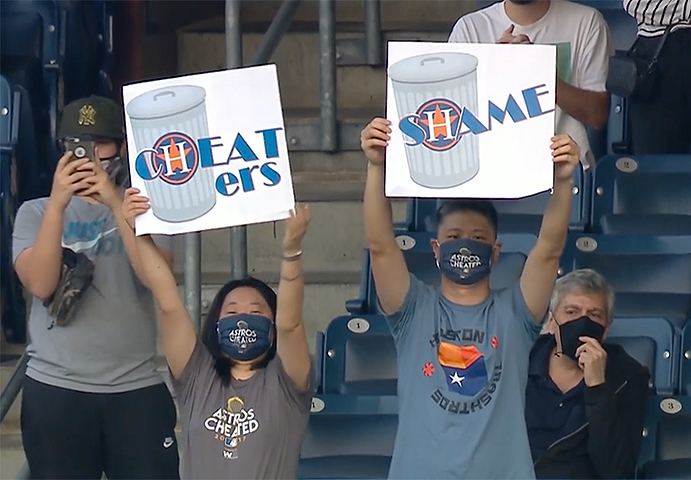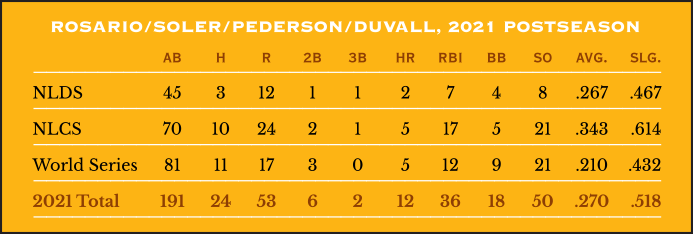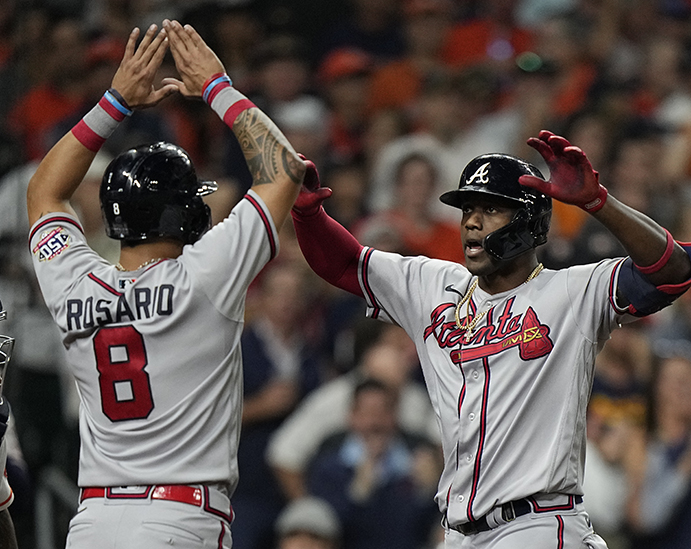THE YEARLY READER
2021: Once Underachievers, Now Underdogs
The Atlanta Braves, once so dominant yet unable to win Baseball’s big prize, performs a role reversal by ruining the championship ambitions of presumably stronger teams in the Dodgers and Astros.
Atlanta’s Jorge Soler is welcomed at home by Eddie Rosario following his three-run smash which opened the scoring in World Series Game Six; the Braves would win the game to clinch their first championship in 26 years. Soler and Rosario, both of whom didn’t join the Braves until August, played huge roles for the ballclub down the stretch and in the postseason. (Associated Press)
The Atlanta Braves were once baseball’s most feared team—in the regular season, that is. From 1991-2005, the Braves easily ruled from Game 1 to 162, finishing first in their division every year save for the strike-shortened 1994 campaign. But by the time October rolled around, Georgia’s baseball peach turned into a lemon; though the Braves managed one world title in 1995, they lost four other World Series, took four defeats at the National League Championship Series, and were given the early boot in the first-round Divisional Series five times. A 63-62 playoff record during this era couldn’t necessarily be laughed at, but it still easily classified as a disappointment given the Braves’ consistent, ultra-elite status.
Fast forward to 2021 and a refreshed Atlanta organization riding a new wave of regular season success. Though worthy enough to rack up four more NL East crowns in succession, the Braves were not their fathers’ juggernaut of the past; the powerhouse label was now reserved for the Los Angeles Dodgers, who had long assumed Atlanta’s old reputation as a regular season master/postseason dud—always expecting to win it all, but frequently falling short of the goal.
For a change, the Braves went into October forecast as the lighter opponent to the nine other postseason challengers, all of whom had better regular season records. And in the ultimate case of role reversal, Atlanta finally got to experience what it was like to be on the other side of expectations, performing as the underdog upsetting the upstarts.
What made the Braves’ first taste of championship glory in 26 years so remarkable was that, for much of the season, few anticipated that the team would even make the playoffs.
That there was even a full regular season played in Major League Baseball was a source of great relief to its owners, players and fans. The COVID-19 pandemic, which had greatly diminished the 2020 baseball season and cost the sport billions, made another hard charge over the winter months and cast enough doubt on a return to normalcy that MLB tried, unsuccessfully, to convince the players’ union to delay Opening Day by a month. But good news came in the spring not just with warmer weather but with the availability of the first vaccines, providing strong protection against the virus.
Although there were a handful of postponed games early in the year due to minor viral outbreaks, the season otherwise progressed with scant disruption. The vast majority of players heeded MLB’s advice to get the vaccine—but lacking a mandate, some chose to decline the jab, with a few of those embracing the anti-vax trope of needing to do more “research.”
Best of all, the cardboard cutouts were put away and real fans returned to the ballparks, if initially not at full capacity. Only the Texas Rangers began the season with every seat available; by July, all other teams joined them with the exception of the Toronto Blue Jays, who weren’t even allowed back in Canada until the end of that month. The fact that the Jays still had to play at less than 100% capacity was outweighed by the joy of playing their first games back at Rogers Centre in nearly two full years.
BTW: Until their return to Toronto, the Blue Jays played their first 21 “home” games at the team’s spring training facility in Dunedin, Florida, followed by 23 contests at the home of their Triple-A affiliate in Buffalo.
The Braves were among the first few teams, after the Rangers, to fully open up their home park. Atlanta fans initially had good reason to go; the team was coming off three straight first-place finishes and featured a young and promising pitching staff offset by the arrival of veteran Charlie Morton, and a potent, All-Star cast of offensive talent including reigning National League MVP Freddie Freeman, All-World outfielder Ronald Acuna Jr., and RBI machine Marcell Ozuna, all under the guidance of sixth-year Braves manager and forever organizational member Brian Snitker. After achingly missing out on a World Series appearance the year before—blowing a three games-to-one NLCS advantage against the almighty Dodgers—the Braves were pining at another shot to pounce on the big prize.
A sluggish start was thought to be short-term but, one after another, additional setbacks complicated the long term. Ozuna, off to a terrible start at the plate, was arrested and later suspended for the rest of the season by MLB for domestic abuse upon his wife. Pitcher Mike Soroka, a breakout star of 2019 who tore his Achilles in 2020, tore it again doing nothing more than walking through the clubhouse. Another pitcher, Huascar Ynoa, ruined a strong start to his season by suffering a broken hand while taking his frustration out on a hard, inanimate object following a rare bad outing. Former Braves outfielder Adam Duvall, now plying his trade for Miami, dished on his former mates with a seven-RBI performance in May. And adding insult to all of the above, MLB stripped Atlanta as host of the 2021 All-Star Game in protest over the State of Georgia’s aim to suppress voting rights.
But what was considered the final nail in the coffin of Atlanta’s 2021 season came on July 10 in Miami when Acuna made a leaping attempt at a deep fly ball and landed awkwardly on the warning track—suffering a season-ending torn ACL. The irony of the night is that the Braves’ win over the Marlins raised their season record to .500 for the first time all year. But without Acuna—who to that point was hitting .284 with 24 home runs, 52 RBIs, 72 runs scored and 17 steals in just 82 games—on top of the losses of Ozuna, Soroka and Ynoa, no one thought much of Atlanta’s chances to stay above the .500 waters, let alone to reach the playoffs.
While the Braves were down, they were not out—thanks in large part to the NL East’s four other teams, neither of whom were running away with the division. The Marlins were the Marlins, threatening no one as usual. The Washington Nationals, two years removed from a world title, were cleaning house after a disappointing start. The Philadelphia Phillies, despite an array of talent featuring eventual NL MVP Bryce Harper, were stripping gears right along with Braves.
That left the New York Mets, the team holding first place for much of the season to date, but tenuously so. This was primarily due to a remarkable first half performance from ace pitcher Jacob deGrom, who was on pace for one of the greatest seasons—perhaps the greatest—ever compiled by a pitcher. But deGrom was increasingly grounded by one ache after another, and when he felt discomfort in his forearm on July 7 against Milwaukee, he had an MRI performed. The hour-long procedure, deGrom claims, made things worse when the pain moved to his elbow while he laid on his stomach with his arm raised. As a result, deGrom never pitched again in 2021; in his absence, the Mets collapsed amid faulty hitting and on/off-field controversies that had become all but endemic within the organization, even with über-wealthy new owner Steve Cohen at the helm.
BTW: For the year, deGrom started 15 games and posted an astonishing 1.08 ERA, striking out 146 batters over 92 innings while allowing just 40 hits.
If the Braves were to overcome the numerous bad breaks and make a late run, they would have to muscle up with roster moves. The Mets and Phillies did their part; New York brought in slick All-Star shortstop Javier Baez from the Chicago Cubs, while Philadelphia dealt for the Rangers’ best starting pitcher (Kyle Gibson) and closer (Ian Kennedy). By comparison, the Braves shunned the big-name transactions and bunched up on mid-level outfielding talent to fill the void left by Acuna and Ozuna. From the Cubs, they received Joc Pederson; from Cleveland, Eddie Rosario; from Kansas City, Jorge Soler; and from the Marlins, they brought back Adam Duvall. With the mild exception of Duvall, this quartet of players had been underperforming for their previous teams, leaving the impression that Atlanta was desperately throwing anything against the wall to see if it would stick.
And for once, it did.
With the roster set, Atlanta finally peaked over the .500 mark for the first time all season on August 6; nine days later, it assumed first place in the NL East, and ended the month setting a franchise record for consecutive road wins (13). To repel a last-gasp effort from second-place Philadelphia, the Braves swept the Phillies in a three-game series during the season’s final week, holding Bryce Harper hitless over 11 at-bats.
BTW: No team had ever reached above .500 for the first time so late in an eventual World Series-winning season than the Braves, who finally got there on August 6 with a 56-55 record.
The arrival of the four reinforcements made an immediate impact. Soler, a pure power masher and little else, thrived in an unorthodox role as leadoff hitter, batting .269 with 14 homers over 55 games. After a slow first impression, Rosario warmed up and displayed his dynamic side by hitting for the cycle in a September game at San Francisco. And Duvall muscled 16 homers and averaged nearly an RBI per game, making him the first NL player ever to lead the circuit in that category (with a career-high 113) playing for multiple teams.
Perhaps inspired, the rest of the Braves took their game up a notch or two. Freddie Freeman and third baseman Austin Riley hit .332 and .333, respectively, after the All-Star Break, anchoring an infield whose two other members—second baseman Ozzie Albies and shortstop Dansby Swanson—powered up to make the Braves the second group of infielders (after the 2008 Marlins) with at least 25 homers each. On the mound, 27-year-old ace Max Fried overcame a wobbly first four months of the season and combined for a 7-0 record over the last two with a 1.46 ERA.
“Tell Them, Wash”
While even some Astros haters might have quietly rooted for Houston’s Dusty Baker to earn his elusive first World Series ring as manager, the Braves’ Fall Classic triumph gave third-base coach Ron Washington his first such ring in 46 years of professional baseball as player, manager or coach. “Wash” was not merely a spectator to the experience; in fact, many Atlanta players attribute the team’s late-season surge to his embracement of “love,” a theme he continually reiterated to the Braves as a way to keep them mentally on point. Shortstop Dansby Swanson certainly bought into Washington’s message. “Love embodies accountability,” he told ESPN’s Jeff Passan. “It embodies sacrifice. We pull for each other. We truly care for each other.” The rest is triumphant history.
After a four-game first-round playoff triumph over the NL Central-winning Milwaukee Brewers—blessed with power pitching but weak hitting—the Braves smelled revenge with an NLCS rematch against the defending champion Dodgers.
For Los Angeles, getting this far was hardly easy. It was highly anticipated that the Dodgers would face stiff divisional competition from the ramped-up, brash San Diego Padres, but stunningly they got it instead from the San Francisco Giants, themselves rebuilt and flourishing with a liberal platoon strategy and outstanding pitching under manager Gabe Kapler.
The Dodgers did all they could to catch the Giants, poaching future Hall-of-Fame ace Max Scherzer and dynamic All-Star second baseman Trea Turner from Washington at the trading deadline to strengthen an already impressive roster. But a franchise record-tying 106 wins would not be enough to catch the Giants, whose 107 set a team mark of its own. Maybe had everything gone perfectly for Los Angeles, it would have prevailed—but nothing ever goes perfect for even the best of teams. Just ask the Dodgers, who absorbed a terrible, injury-riddled off-year for outfielder Cody Bellinger (.165 batting average) and lengthy absences to shortstop Corey Seager and veteran hurlers Clayton Kershaw and Trevor Bauer.
BTW: Bauer, MLB’s highest-paid player ($38 million) in his first year at Los Angeles, was placed on administrative leave at the end of June when a woman alleged that he assaulted her during sexual activity; Bauer claims that the rough stuff was consensual.
The Dodgers would get the last laugh on the Giants in the first-round NLDS, the first postseason series ever between the two archrivals. In an intensely tight, hard-fought five-game series that went right down to the wire, the Dodgers took the decisive game on a tie-breaking ninth-inning run and a save from Scherzer, the first of the ace’s career. But victory for the Dodgers would be costly; Scherzer, burned out by his relief outing on two days’ rest, would later profess that his arm was all but dead for the NLCS and Braves.
Atlanta won the first two games of the NLCS with walk-off hits and furthered the series advantage to three games to one—but just 12 months earlier, the Braves had been at that same doorstep to the World Series, only to lose three straight games and the series to the Dodgers. When Los Angeles took Game Five with an 11-2 romp, Braves fans and players began to get that awful feeling of déjà vu creeping back in. That’s when Eddie Rosario stepped up—as he frankly had been doing all series. The ex-Cleveland outfielder smoked a three-run homer in Game Six off Dodgers starter Walker Buehler—pitching on three days’ rest in place of the depleted Scherzer. Rosario’s blast was the killer blow in a 4-2 clincher, earning him the NLCS MVP with a postseason series record-tying 14 hits.
Ensuring the Braves’ first NL pennant since 1999 was left-handed reliever Tyler Matzek, who in Game Six entered a situation worthy of Houdini: No outs, the tying run at second base, and three right-handed Dodger bats—including star threat Mookie Betts and aging but still dangerous Albert Pujols—ready to extend the comeback narrative of a year earlier. Matzek denied a repeat of history; he struck out all three Dodgers, to the delirium of 43,000 Truist Park supporters.
The Braves may not have entered the World Series as favorites at the sportsbook, but they certainly did among the majority of the viewing public. That’s because their opponents, the Houston Astros, had long since been cast as the villain.
A year earlier, the Astros came within a game of the World Series and were spared the wrath of fans irate over the news that they cheated their way to a world title in 2017, as a monopoly of cardboard cutouts provided no sass from the stands in the shortened 2020 pandemic season. But with the cutouts stored away and real fans back in the seats for 2021—even if initially in limited quantity—the Astros Payback Tour was back on as enraged fans let the team know how they felt about their cheating ways. And it wasn’t just the patrons who left the Astros’ two biggest stars shaken; middle infielders Carlos Correa and Jose Altuve, selected for the All-Star Game, hid behind weak excuses and stayed home—perhaps out of fear of sharing an American League clubhouse with members of teams they swindled four years earlier.

A pair of fans show their displeasure at Houston players during a May 4 game at Yankee Stadium—the Astros’ first at New York since it was revealed that they cheated their way to the 2017 world title. After playing to empty seats in 2020, the Astros had to absorb 81 road games’ worth of vocal and visual fury in 2021. (YES)
Amid the cacophony of catcalls, the Astros managed to stay focused and commanding on the field. They began the season with four straight wins at divisional rival Oakland—outscoring them 35-9 in the process. With a sound base of mostly no-name pitching contrasted with an All-Star lineup of hitters including Altuve (.278 average, 31 homers, 117 runs scored), Correa (.279, 26 homers, 92 RBIs), first baseman Yuli Gurriel (an AL-best .319 average), DH Yordan Alvarez (33 homers, 104 RBIs) and outfielder Kyle Tucker (.294, 30 homers, 92 RBIs), Houston still had to play catch-up with a tougher AL West, highlighted by the always competitive A’s and surprising Seattle Mariners. But once the Astros finally grabbed first place, on June 21 with the help of an 11-game win streak, they never looked back—keeping the two aforementioned ballclubs at arms’ length on their way to the postseason.
Houston enjoyed an easy first-round triumph of the Chicago White Sox, led by 76-year-old Tony La Russa after a 10-year hiatus, to reach its fifth consecutive ALCS. The Astros’ mission was more challenging against the Boston Red Sox, revived after a pandemic slump the year before and managed once more by Alex Cora, brought back by the team following his year-long suspension for his role in Houston’s cheating scandal as bench coach.
The Astros won Game One, but the Red Sox scored early and often over the next two contests, blasting out a total of three grand slams—and took an early 2-1 lead after an inning in Game Four, continuing to reduce Houston’s resilient rotation to shambles. In desperate need of a momentum shift, the Astros got one—rendering Boston’s bats silent throughout the rest of Game Four, tying the score in the eighth and then exploding for seven runs in the ninth for a 9-2 victory, evening the series. From there, Houston starting pitchers came rousing back to life; Framber Valdez allowed a run through eight innings in an easy 9-1 Game Five win at Fenway Park, and in Game Six back at Houston, rookie Luis Garcia—rocking a unique, complicated pitching motion that included baby cradling and a false step forward—took a no-hitter into the sixth, giving the Astros breathing room early before pulling away with a series-clinching, 5-0 triumph.
BTW: Much like the Braves’ Eddie Rosario in the NLCS, the Astros’ Yordan Alvarez was unstoppable in the ALCS, going 12-for-22 with three doubles, a triple, a home run and six RBIs against Boston.
Leading off the World Series, Jorge Soler displayed the pace-setting skills he’d perfected since arriving in Atlanta, homering on the third pitch of Game One off Valdez; it was the first strike in the Braves’ 6-2 victory. Soler wasn’t done; in Game Four, he followed a Dansby Swanson solo homer in the seventh inning with one of his own, the eventual winning run in a 3-2 victory that gave Atlanta a 3-1 series lead; and in Game Six, he smoked a three-run, tape-measure blast that cleared the Minute Maid Park railroad track high above the left field bleachers, giving the Braves a 3-0 lead—on their way to a 7-0 shutout victory to clinch the championship.
As Soler led Atlanta with an MVP effort, while four other Braves (Duvall, Swanson, Freddie Freeman and catcher Travis d’Arnaud) each belted a pair of homers against the Astros, it was the team’s pitching that earned equal praise. The bullpen certainly answered the call—posting a 2.51 series ERA after being taxed into extended duty as Charlie Morton’s knee fracture in Game One reduced the Atlanta rotation to two qualified starters. Those two—Ian Anderson and Max Fried—weren’t too shabby themselves; the second-year Anderson, technically still a rookie, threw five no-hit innings in a 2-0 Game Three win while Fried, in the Game Six clincher, stayed sharp for six shutout frames even after a first-inning stomping upon his ankle from Houston’s Michael Brantley, trying to beat out a grounder at first where Fried was covering. Overall, the high-powered Astros were out-homered by Atlanta, 11-2—Jose Altuve hit both for Houston—and compiled a measly .596 OPS (on-base percentage plus slugging percentage).
Four Trades and a Championship
The quartet of outfielders acquired by Atlanta in July—Eddie Rosario, Joc Pederson, Adam Duvall and Jorge Soler—paid productive dividends in the postseason, as their combined numbers in the three 2021 playoff series below show.

For the Braves and Major League Baseball, the 2021 season was an exercise in overcoming challenge—key personnel losses for Atlanta, the ongoing pandemic for MLB. As the year ended, more obstacles lay ahead; a new COVID variant, Omicron, was fast spreading into the winter and threatening to shut society down once more, while major league owners and players failed to reach agreement on a new Collective Bargaining Agreement in December—initiating a lockout and the possibility of the first work stoppage in 27 years.
Thus for the second straight winter, Baseball looked toward the end of the tunnel in search of light that wasn’t terribly bright.
 Back to 2020: Panemicmodium Baseball endures the unexpected challenge of trying to wring out a season as a largely unchecked pandemic rages through America.
Back to 2020: Panemicmodium Baseball endures the unexpected challenge of trying to wring out a season as a largely unchecked pandemic rages through America.
 Forward to 2022: Houston Again, Honestly Five years after cheating their way to their first World Series title, the Houston Astros return to baseball’s mountaintop—this time without fraudulence.
Forward to 2022: Houston Again, Honestly Five years after cheating their way to their first World Series title, the Houston Astros return to baseball’s mountaintop—this time without fraudulence.
 2021 Leaders & Honors Our list of baseball’s top 10 hitters and pitchers in both the American League and National League for the 2021 baseball season, as well as the awards and honors given to the game’s top achievers of the year.
2021 Leaders & Honors Our list of baseball’s top 10 hitters and pitchers in both the American League and National League for the 2021 baseball season, as well as the awards and honors given to the game’s top achievers of the year.
 The 2020s: The Turbulent Twenties Intended changes and unexpected disruption mark a time when Baseball attempts to appeal to a bigger audience, risking the loyalty of its most ardent followers. But an impressive influx of talented young players hopes to rescue the era and keep everyone happy.
The 2020s: The Turbulent Twenties Intended changes and unexpected disruption mark a time when Baseball attempts to appeal to a bigger audience, risking the loyalty of its most ardent followers. But an impressive influx of talented young players hopes to rescue the era and keep everyone happy.






